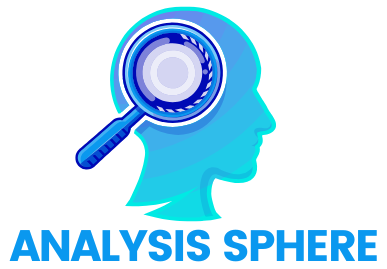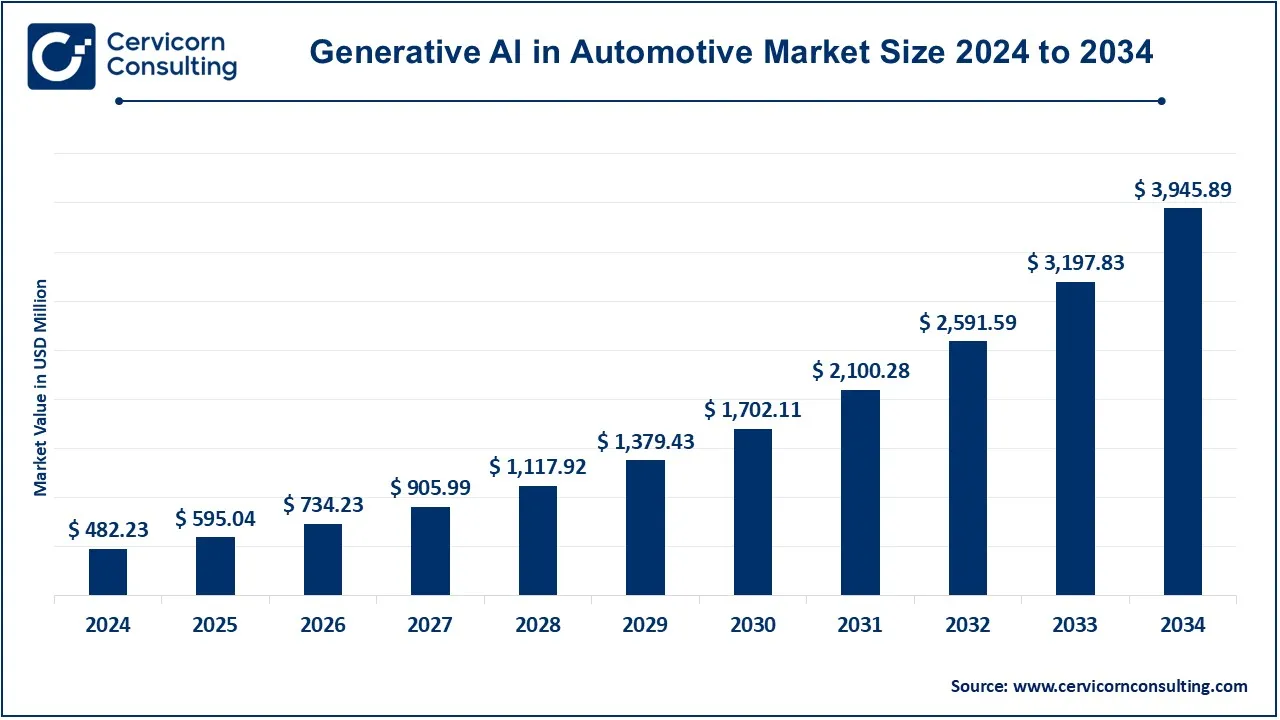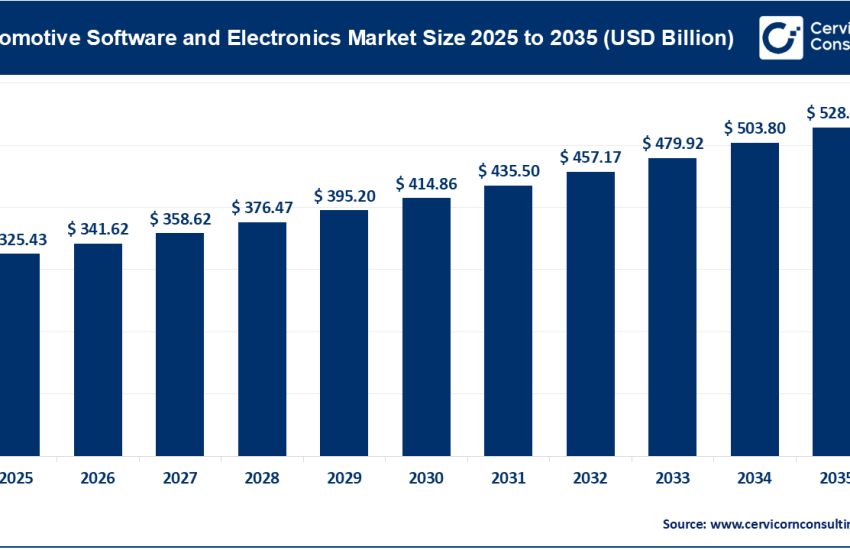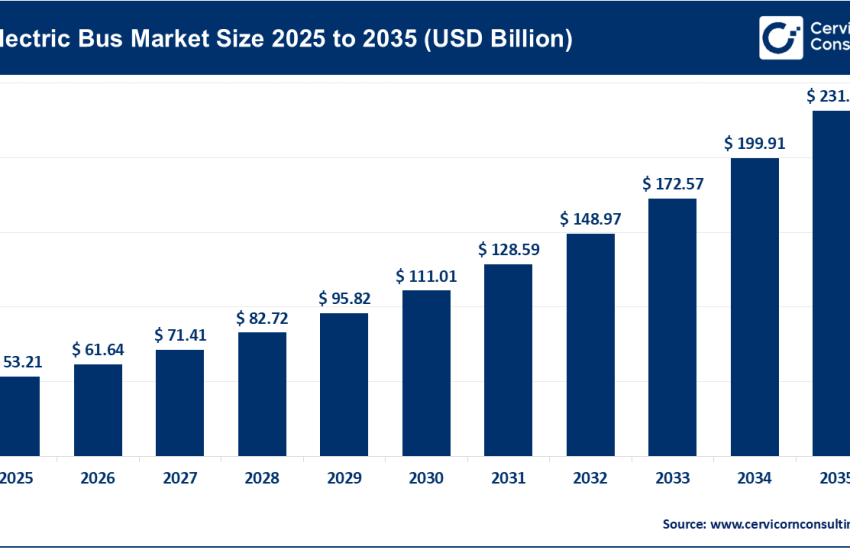Generative AI in Automotive Market Growth, Trends, Top Companies, and Forecasts (2025–2034)
Generative AI in Automotive Market Growth
The global generative Al in automotive market was worth USD 482.23 million in 2024 and is anticipated to expand to around USD 3,945.89 million by 2034, registering a compound annual growth rate (CAGR) of 25.65% from 2025 to 2034.
The generative AI in automotive market is experiencing rapid growth due to advancements in AI technologies, the increasing demand for autonomous vehicles, heightened focus on fuel efficiency and sustainability, and the growing trend of connected cars. Government initiatives promoting AI adoption and investments in R&D further fuel this growth.
What is Generative AI in the Automotive Market?
Generative AI in the automotive market refers to the application of advanced artificial intelligence technologies that can create, optimize, and simulate various aspects of automotive design, manufacturing, operations, and customer experience. Leveraging deep learning, machine learning, and neural networks, generative AI enables the creation of novel designs, predictive maintenance models, and enhanced driving experiences by learning from vast datasets. This technology is revolutionizing the automotive industry by driving innovation and reducing time-to-market.
Why is Generative AI Important in the Automotive Market?
Generative AI holds transformative potential in the automotive sector, addressing critical industry challenges such as efficiency, safety, and sustainability. Its importance stems from its ability to:
- Accelerate vehicle design processes through automated generative design.
- Enhance operational efficiency with predictive analytics.
- Improve customer satisfaction by personalizing experiences and in-vehicle systems.
- Support autonomous driving advancements through real-time decision-making and enhanced simulations.
By enabling smarter, safer, and more efficient automotive systems, generative AI is poised to redefine the industry’s landscape.
Get a Free Sample: https://www.cervicornconsulting.com/sample/2476
Generative AI in Automotive Market: Top Companies
Microsoft
- Specialization: Cloud-based AI solutions, machine learning frameworks, and autonomous driving support.
- Key Focus Areas: AI-powered simulation tools, predictive analytics, and vehicle-to-everything (V2X) communication systems.
- Notable Features: Azure Machine Learning for automotive applications, robust AI toolkits, and integration capabilities.
- 2023 Revenue (approx.): $211 billion (total revenue).
- Market Share (approx.): Significant presence in software and AI services.
- Global Presence: Operations across over 190 countries with partnerships in major automotive markets.
AUDI AG
- Specialization: Automotive manufacturing and design.
- Key Focus Areas: AI-assisted vehicle design, autonomous driving technologies, and predictive maintenance.
- Notable Features: Implementation of AI in concept cars and adaptive in-vehicle systems.
- 2023 Revenue (approx.): €66.6 billion.
- Market Share (approx.): Leading in luxury automotive innovation.
- Global Presence: Strong presence in Europe, North America, and Asia.
Intel Corporation
- Specialization: Semiconductors and AI hardware/software solutions.
- Key Focus Areas: AI chips for autonomous vehicles, edge computing, and data processing solutions.
- Notable Features: Mobileye technology for ADAS (Advanced Driver Assistance Systems).
- 2023 Revenue (approx.): $63 billion.
- Market Share (approx.): 15% in automotive AI hardware.
- Global Presence: Extensive global footprint with partnerships in key automotive markets.
Tesla Inc.
- Specialization: Electric vehicles and autonomous driving technologies.
- Key Focus Areas: Self-driving capabilities, in-vehicle AI assistants, and energy-efficient systems.
- Notable Features: Autopilot and Full Self-Driving (FSD) features powered by AI.
- 2023 Revenue (approx.): $95 billion.
- Market Share (approx.): 20% in the electric vehicle market.
- Global Presence: Major presence in North America, Europe, and China.
Uber Technologies
- Specialization: Ride-hailing and mobility solutions.
- Key Focus Areas: Autonomous vehicle development and AI-powered route optimization.
- Notable Features: AI-driven demand forecasting and fleet management systems.
- 2023 Revenue (approx.): $37 billion.
- Market Share (approx.): Leader in mobility-as-a-service.
- Global Presence: Active in over 70 countries.
Leading Trends and Their Impact
1. AI-Driven Autonomous Driving
Generative AI is accelerating the development of autonomous vehicles by enabling real-time decision-making, high-fidelity simulations, and enhanced perception systems. Companies like Tesla and Intel are leveraging generative AI to enhance their self-driving capabilities, reducing reliance on physical testing.
2. Generative Design in Automotive Manufacturing
AI tools are transforming vehicle design by generating innovative, lightweight, and sustainable designs. For example, Audi uses generative design to create components with enhanced performance and reduced material usage.
3. Predictive Maintenance and Diagnostics
By analyzing vehicle data in real-time, generative AI predicts potential failures, reducing downtime and maintenance costs. Microsoft’s Azure platform is a key player in predictive analytics for the automotive sector.
4. Enhanced Human-Machine Interaction (HMI)
Generative AI powers in-car virtual assistants, improving user experience through natural language processing and adaptive learning. Tesla’s in-vehicle AI assistant exemplifies this trend.
5. AI in Electric Vehicle (EV) Optimization
Generative AI optimizes EV battery performance and charging efficiency, addressing key challenges in the EV market. Tesla leads this trend with its AI-enhanced energy management systems.
Successful Examples of Generative AI in the Automotive Market
- Tesla’s Full Self-Driving (FSD) Technology Tesla’s FSD system employs generative AI to enable semi-autonomous driving, navigating complex environments with minimal human intervention.
- Audi’s AI:ME Concept Car Audi’s AI:ME integrates generative AI for autonomous capabilities, intelligent HMI, and smart city connectivity.
- Mobileye’s ADAS Solutions Intel’s Mobileye division leverages generative AI to provide ADAS solutions, improving safety and driving assistance in vehicles worldwide.
- Uber ATG (Advanced Technologies Group) Uber’s self-driving car program uses generative AI for route planning and obstacle detection, enhancing its autonomous ride-hailing services.
- Microsoft’s Partnership with Automotive Giants Microsoft’s AI-powered platforms enable predictive maintenance, connected car solutions, and enhanced vehicle designs for multiple OEMs.
Regional Analysis: Government Initiatives and Policies Shaping the Market
North America
- Key Trends: Strong focus on autonomous vehicles, robust investments in AI R&D.
- Government Initiatives: U.S. Department of Transportation (DOT) policies promoting AI in mobility; tax incentives for AI-based innovations.
- Market Highlights: Tesla and Uber are leading players; strong venture capital ecosystem.
Europe
- Key Trends: Emphasis on sustainability and smart mobility.
- Government Initiatives: EU’s AI Act, funding programs like Horizon Europe for automotive AI R&D.
- Market Highlights: Audi’s innovations and partnerships with AI startups are driving growth.
Asia-Pacific
- Key Trends: Rapid adoption of AI in electric and connected vehicles.
- Government Initiatives: China’s AI strategy emphasizing smart vehicles; India’s push for EVs with AI integration.
- Market Highlights: Major investments from Intel and Tesla; rising presence of Chinese tech companies.
Latin America
- Key Trends: Growing focus on AI in public transportation systems.
- Government Initiatives: Policies supporting smart mobility solutions and AI in logistics.
- Market Highlights: Emerging collaborations with global AI leaders.
Middle East & Africa
- Key Trends: Increasing investments in AI-powered transportation infrastructure.
- Government Initiatives: Smart city projects in the UAE; AI-driven mobility innovations.
- Market Highlights: Regional partnerships with companies like Microsoft and Uber.
To Get Detailed Overview, Contact Us: https://www.cervicornconsulting.com/contact-us
Read Report: Electric Vehicle Market Growth Drivers, Trends & Top Companies by 2034



